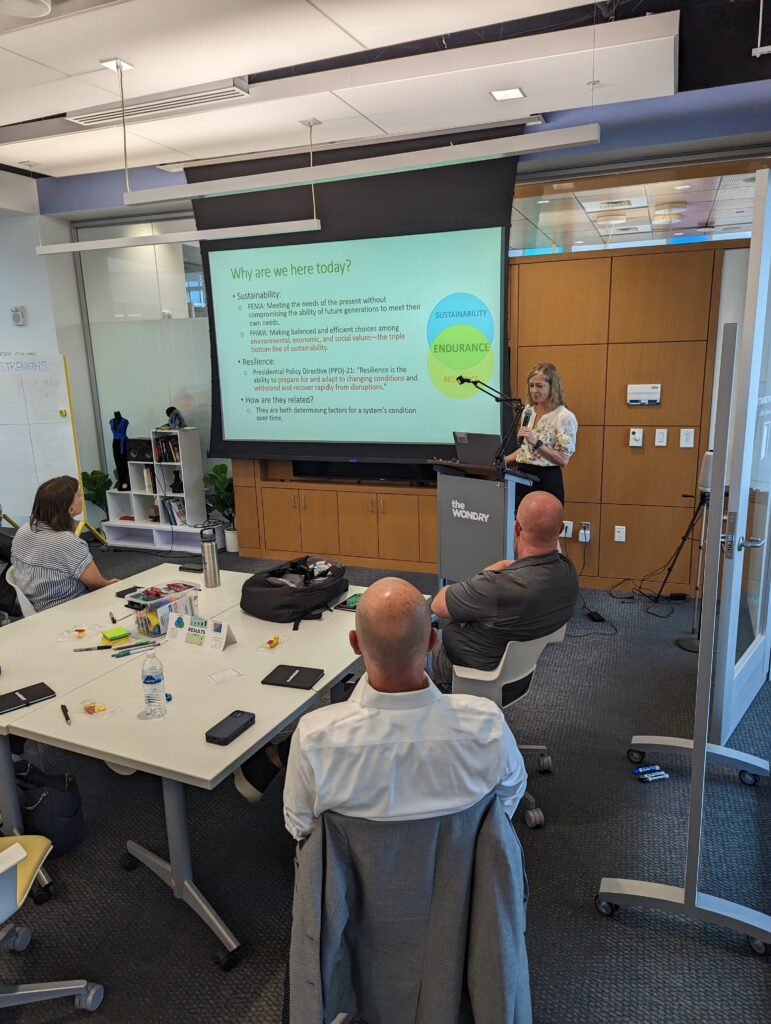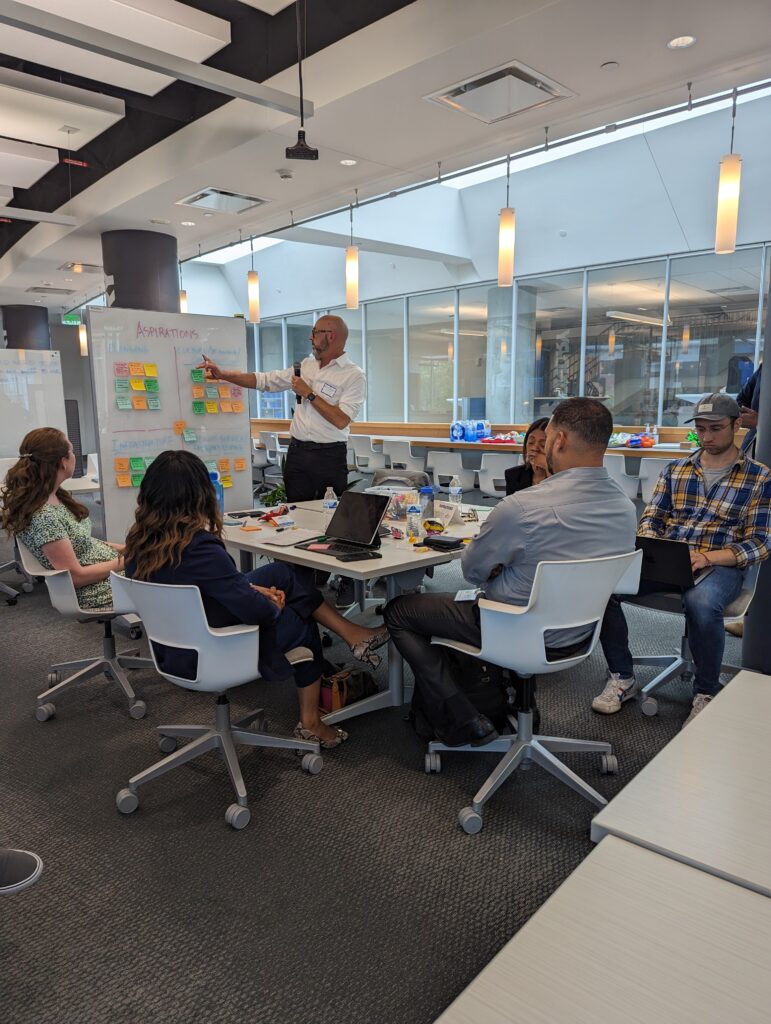NASHVILLE, TN – The City of Nashville and Davidson County (Metro) is no stranger to climate-related challenges. According to the National Oceanic and Atmospheric Administration, the 2021 winter storm that blanketed Tennessee and many other states was the costliest U.S. winter storm on record. Formidable EF3 tornadoes in 2020 and 2023, flash floods in 2021, and Winter Storm Elliott in 2022 have also wreaked havoc on the city, tested its resilience, and highlighted the need for municipal governments to bolster their preparedness against climate shocks and stresses. The overarching threat of the COVID-19 pandemic and other manmade crises further exacerbated these challenges.
With this in mind, Metro has taken several commendable steps:
- Signing onto the Global Covenant of Mayors for Climate and Energy;
- Appointing Director of Sustainability and Resilience Officer Kendra Abkowitz;
- Developing a committee-led Climate Action Plan focused on mitigation priorities;
- Collaborating with FUSE for resilience-focused initiatives, resulting in the development of the Climate Adaptation and Resilience Plan (CARP);
- Committing to the Race to Resilience.
In parallel to developing an overarching resilience plan, in line with the Global Covenant of Mayors’ requirements, Metro is pioneering an integrated approach. Metro is aligning its resilience vision with daily operations by devising ways to incorporate resilience within each department’s strategic planning processes. This strategy, championed by FUSE Executive Fellow Kristin Stroup (2022–23), aims to ensure that all of Nashville’s policies and programs are robust enough to weather manufactured and natural shocks.
Designing a Sustainable Tomorrow
Not long after taking office in 2019, Mayor John Cooper, whose term ended in September 2023, joined the Global Covenant of Mayors, signaling Nashville’s commitment to tackle climate change head-on. This led to the release of Metro’s Climate Action Plan in 2021. The CARP elaborates on Metro’s proactive approach, preparing Metro and its citizens for the impacts of climate change and ensuring its ability to thrive in the future. Input from over 50 Metro departments and community stakeholders helped develop the CARP. Following a public feedback period, Stroup is helping finalize the CARP under the enthusiastic support and leadership of the current mayor, Freddie O’Connell.
The Plan focuses on building climate adaptation capacity and resilience, addressing the city’s main climate hazards, including extreme heat and heat waves, severe storms, and flash flooding. It prioritizes those hazards that have significant health and quality of life impacts on vulnerable populations due to historical and systemic social inequality, like redlining and disinvestment, recognizing the disproportionate impacts of climate change on racial and ethnic minority groups. The Plan’s emphasis on frontline communities, including those living in urban heat islands and facing homelessness, reflects a commitment to equity in climate resilience.
“That some of Nashville’s residents are more vulnerable to external shocks than others is not due to any fault of their own. Achieving true resilience requires looking at the big picture and correcting past wrongs and ongoing imbalances,” Stroup notes, “I hope this plan sets Nashville in the right direction to build true resilience in an equitable, forward-thinking, and holistic way.”
Making Climate Change Personal
Stroup’s Executive Fellowship project aimed to develop a toolkit and suite of resources for Metro’s departments that would build their capacities to identify climate-driven risk and implement adaptation strategies. To achieve this objective, Stroup and Abkowitz, in collaboration with the Wond’ry, Vanderbilt University’s Innovation Center, brought together 25 thought leaders from 12 different Metro departments throughout three workshops in Summer 2023 to work through the barriers, opportunities, and needs for improving the city’s resilience.
Recognizing the significance of community input, the Plan extended beyond Metro boundaries. Outreach to stakeholders, including the committee that developed the Climate Action Plan, the Nashville Environmental Justice Initiative, the Community Planning Team that oversees Metro’s Multi-Hazard Mitigation Plan, and community advocacy and youth groups, ensured diverse perspectives. Metro also collected feedback from the general public, informing the Plan by linking climate risks with the everyday concerns of residents. However, the timeframe to conduct meaningful public engagement was limited and is still to come.



Bridging the gap between climate change and essential needs helps residents comprehend the tangible impacts. The Plan strives ultimately to empower residents with knowledge and tools to prepare for and mitigate the challenges of a changing climate. While time constraints limited public outreach efforts during the Plan’s development, future robust public outreach campaigns are in the works.
Across the country, people face increasing hardships, and talking about climate change can feel abstract, irrelevant, and tone-deaf if not put in the proper context. So it’s crucial that people understand how climate-driven hazards like heat waves increase the threat of their everyday challenges, and improving their quality of life and safety must include incorporating specific safeguards.
Kristin Stroup, FUSE Executive Fellow
As a result of internal and external feedback, Metro crafted two parallel action plans: a multi-pronged strategy for improving the climate robustness of Metro’s public assets, services, and programs, culminating in the CARP, and an internal roadmap to build the capacity and operating procedures of Nashville’s public servants such that they can create a more sustainable and resilient future for the city.
Understanding Nashville’s Climate Threats
While Metro has made significant policy changes to address flood risk and strengthen building codes over the last decade, the most recent tornadoes that killed six people are a woeful reminder that Metro must act quickly and swiftly to continue to protect its residents as the frequency and intensity of rainfall, heat, and tornadoes are increasing in Nashville.
Based on historical data and projected future impacts, the draft focuses on five primary climate hazards: flooding, tornadoes, extreme temperatures (both heat and cold), and severe thunderstorms. Metro’s first-ever climate risk assessment and adaptation and resilience plan, the CARP is designed to catalyze additional planning action within Metro. Co-authors Stroup and Abkowitz delineated a roadmap with nearly 60 potential solutions, from setting even stronger building codes to promoting green roofs and ensuring affordable mental health services.
The CARP looks at the direct impacts of the changing climate on Nashville’s residents and microcosm while considering cascading effects and how these lead to vulnerability outcomes for historically neglected communities. For instance, a striking correlation between historical redlining and urban heat islands highlights the compounding factors exacerbating vulnerability to climate change impacts. People living in denser areas of the city that have seen underinvestment compared to those living in the suburbs with more green space can experience a 12-degree Fahrenheit difference in the heat of summer. In particular, households who live in historically redlined neighborhoods are often heavily utility-burdened, where they spend upwards of 10% of their income on electricity costs. Compounded with the high cost of poor-quality housing and the threat of gentrification, families must make difficult compromises, sacrificing other necessities. In extreme cases, the financial insecurity resulting from rising costs and the climate threat multiplier can lead to poor health outcomes and even homelessness. By addressing underlying root causes, the Plan aims to alleviate the cascading impacts on affected households, promoting policies and programs focused on building overall resilience.
“What was important in this plan was to look at what Metro leadership and staff could control,” Stroup explains, “We can’t control everything, but what existing programs and initiatives Metro currently offers can we build on? What can we do to infuse those programs and initiatives with an equitable climate resilience lens to ensure those programs build adaptive capacity, particularly for disadvantaged residents, and give the city a better chance to stay safe?”
Through four main goals, the CARP aims to (1) ensure that Nashville is equitable, safe, accessible, and affordable for all residents in the context of a changing climate, (2) improve and protect public infrastructure and services from growing climate risks, (3) protect and preserve nature for future generations, and (4) make climate resilience a standard operating procedure for Metro Government. The Plan identifies several strategies for implementation in the near term, including actions that Metro should pursue over the coming year. As an outcome of the CARP’s alignment with many of Metro’s other plans and existing initiatives, and in recognition of the resource constraints typical to public sector work, the CARP aims to build resilience into existing initiatives and programs in the near term rather than launch new ones.
Looking Ahead: A Blueprint for a Resilient Nashville
The Plan garnered the support of the Mayor’s Office, Metro department leaders, and elected officials and has been well-received by Metro’s external stakeholders. However, as with any ambitious initiative, challenges abound. The recurrent use of terms like “incentivize” and “where feasible” in the Plan is a reminder of potential resistance from various community stakeholders and interests, and access to limited resources must be balanced across numerous municipal priorities. Addressing emerging challenges like insurance companies reconsidering climate disaster coverage and green gentrification and looking beyond the top five hazards will be essential as Nashville marches forward.
Nonetheless, the goal remains to fortify Nashville’s residents, businesses, and assets against climate-driven disasters while incorporating strategies to reduce the threats of economic and geographic displacement, which continue to exacerbate existing inequalities. With a 10-year planning horizon and a commitment to annual updates based on public feedback and arising learning opportunities during the Plan’s implementation, the CARP positions Nashville to foster a climate-resilient community for generations. Notably, the implementation roadmap outlined in the Plan must align with Metro’s budgeting approval processes. These imperatives are in motion, and Metro’s journey toward resilience is ongoing.
With determination, community engagement, and strategic planning, Nashville is poised to emerge more resilient than ever. ”Nashville is a beautiful, vibrant, and unique city. All its residents deserve access to opportunities for betterment, to pursue their dreams, and to ensure their children have a safe and promising future,” Abkowitz says. “The work Nashville’s dedicated civil servants have undertaken during this past year, and the creation of the Climate Adaptation and Resilience Plan, represent an important step, but it is a first step. There is work to do. Plans are only worthwhile when carried out.”


